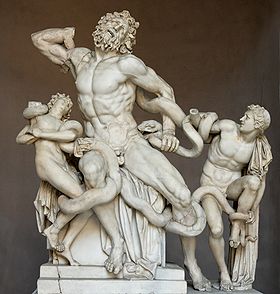Click here for direct link to audio Episode #20.
Click here for previous episodes.
So many of you have asked me: What do you think of Wolfgang Petersen’s film Troy?
Well, filmmakers always tamper with characters and situations from the original story, and Petersen is no exception. But I ask where, Â in Homer’s name, is the real tale of the death of Ajax? And where, indeed, is Laocoon, the great seer, who with his sons was dragged to his watery death by a sea serpent when he tried to tell King Priam that the wooden horse would bring about the end of Troy?
The “greatness†of great story lies in the portrayal of the depth of human character. That a director has 180 minutes in which to show the scope of human triumph and tragedy is unrealistic. One must go to the source of these great stories in order to learn from them.
And how do we as humans display character? By the small things we do each day. In times of peace, it might be something as simple as nodding to the driver who yields their right of way. Or by patiently accepting the customer service routine from eager teen clerks because they are in training. And in times of crisis and war, we might reveal our character by resolving not to look at images of humiliation, or by remaining speechless in a time of sorrow and shame. These minor actions and inactions reveal the complexities of the human mind, heart, and spirit in ways, that in the rush of our lives, we often fail to see. It is precisely the lack of these simple human gestures that keeps modern film epics from attaining greatness. Wolfgang Petersen’s Troy is by its very nature crippled in its attempts. But, hey, using technology to create the image of the “launch of a thousand ships” was pretty cool! And then Brad Pitt as Achilles, well, what can I say?
Listen to this week’s podcast to find out how Petersen’s film differed from the original epic. Enjoy!
